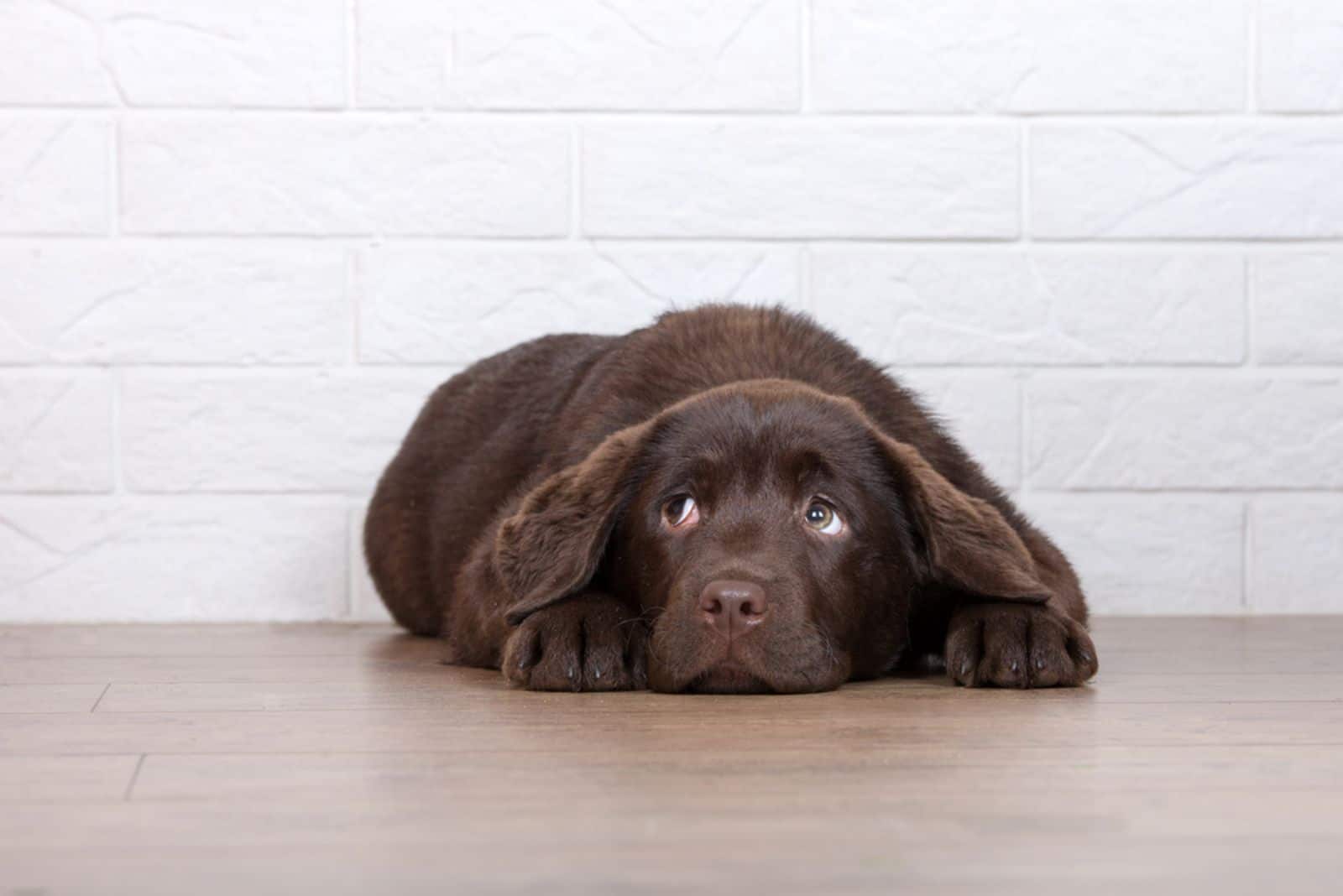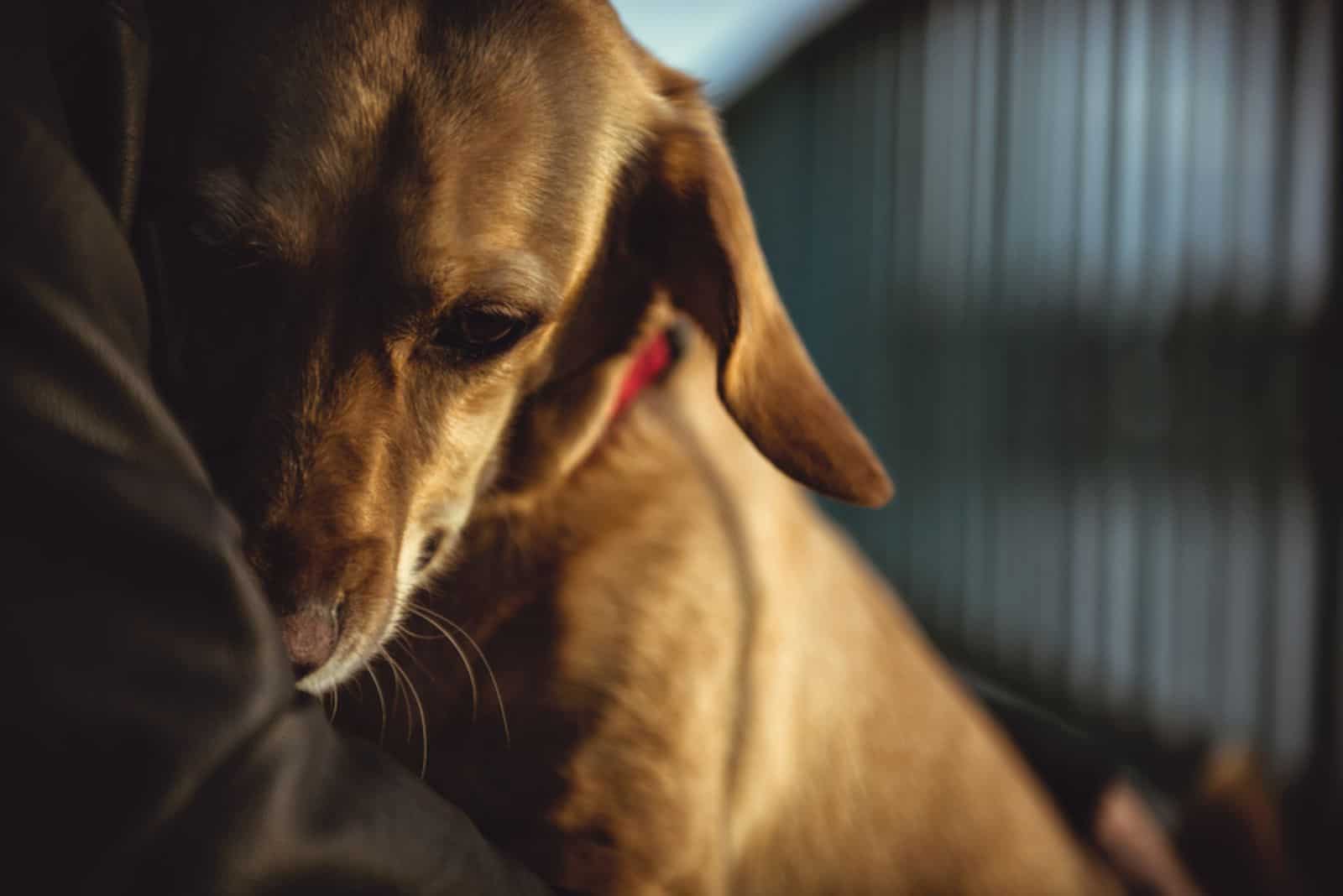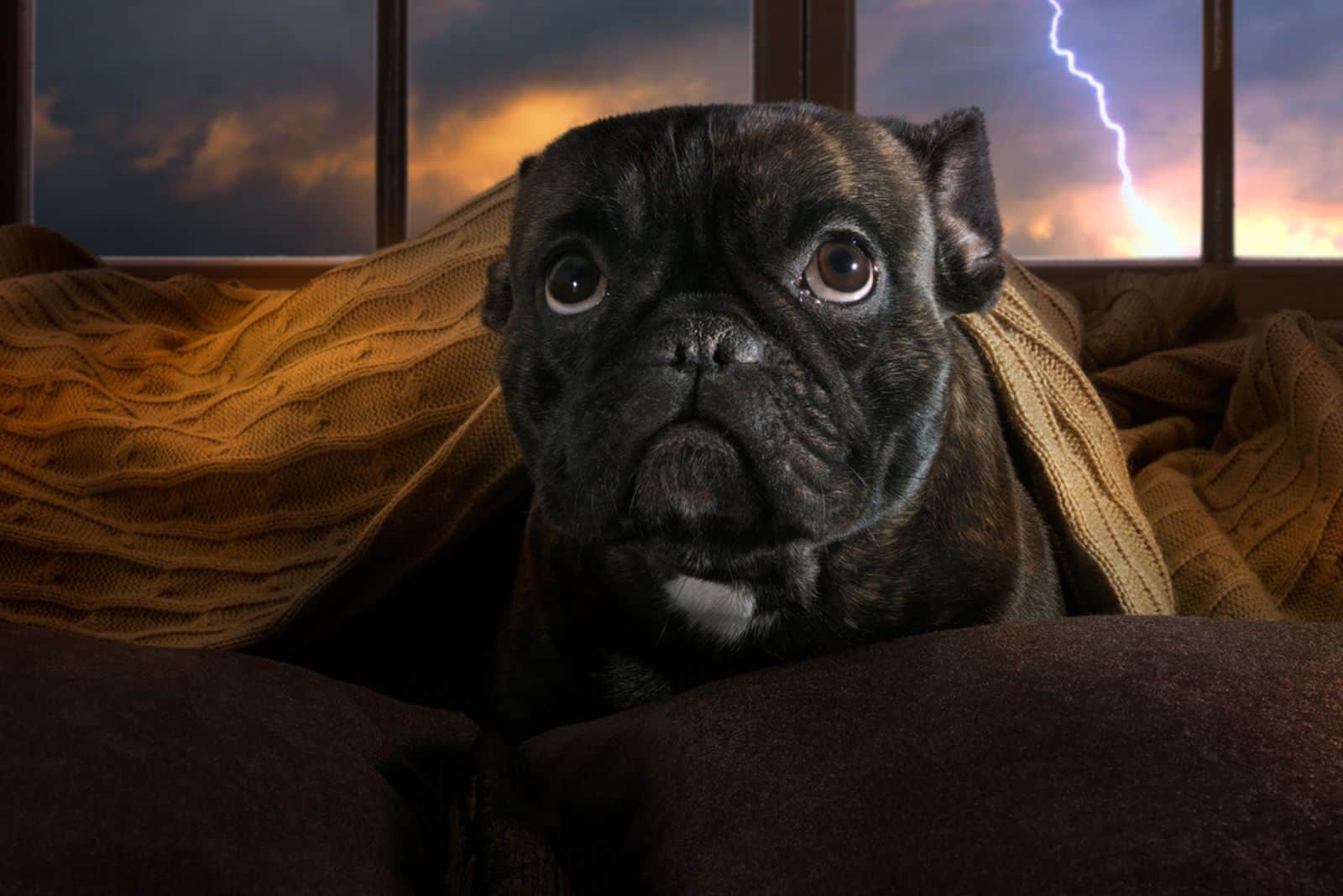Humans have their own set of fears, but dogs in particular seem to share a few of theirs among their entire kind, particularly the fear of thunder, but why are dogs scared of thunder so much?
Well, one of the main reasons as to why dogs are scared of thunder is noise aversion, dogs don’t really like any form of loud noise all that much after all.
However, that isn’t the only reason. Two other possible culprits exist, one being static electricity of all things, and the other, final one, being an increase in separation anxiety.
The fear can manifest signs in many different ways, be it the standard whining, barking or howling toward the source of the noise, or other signs of anxious behavior like constant pacing and somewhat oddball acts that you wouldn’t expect from your pooch.
You’re more than likely to see him show signs of fear on top of that too, the whole tail tucked between his legs with wide eyes and his ears down and back.
It can be accompanied by anxious lip licking and the pitter patter of his front feet as well.
But is there anything that can be done about this? Is there a way to mitigate this intense phobia?
To find that out as well as find out the full reasons behind this type of behavior, be sure to read on.
The 3 Main Reasons As To Why Dogs Are Scared Of Thunder
As mentioned at the start, there are 3 main causes to this odd fear, and they are as follows:
Canine Noise Aversion

The most common and logical of the three is noise aversion. Dogs have particularly sensitive ears and any form of loud bang is sure to scare them.
Thunder is just one of the more common ones, the other culprits that fall under this category include, but aren’t limited to: guns, fireworks, vacuum cleaners, etc.
While it’s not a prevalent cause, almost half of the dog population has some form of noise aversion while some appear to be completely immune to it.
The ones that appear to be most prone to them are Australian Shepherds and Border Collies in particular due to some genetic predispositions.
That said, any dog can develop it and it’s known to only get worse and more intense with constant exposure to the inciting phenomenon, much like any fear would, so do try and limit it as best you can, or at the very least provide him with support during this troubled time.
At certain points, it can get so bad that even adjacent noises to the one triggering this phobia can start becoming a trigger.
For instance, the sound of the sizzling fuse for a firework, the loading sound of a gun or a rifle or the sound of rain that falls in between the sonic booms of thunder.
They recognize it as a kind of omen that precedes the event and will start pre-emptively entering their coping mechanisms.
The development of a noise phobia isn’t age limited either and can affect anyone from young pups to senior doggos, but once the dog enters adulthood, he seems to become more sensitive to noise as that’s when his sense of hearing is at its sharpest.
Static Electricity Buildup

Though more likely to affect dogs with longer coats, double coats or simply larger dogs with more fur surface area, static buildup can be yet another scare factor which contributes to this fear of thunderstorms.
After all, the air gets more electrically charged when thunderstorms are about, making it more likely for the dog’s fur to build a static charge which then gets discharged should the dog approach any metallic surface.
This is particularly scary for them if it zaps them over their nose which is one of the more likely places it’ll happen, given the dog’s tendency to interact with everything through his sense of smell.
While the shock itself won’t cause him any harm, if it happens frequently enough, it’ll scare him senseless and will likely cause him to run to the basement if you have one.
The reason for that being that the basement is often a grounded area with a lot less risk of suffering from static shock.
It can lead to a full on fear of thunder for that very reason if this is something that happens to him often and only gets worse over time.
Sadly, there isn’t much you can do about it in this case unless you plan on wrapping your dog up in foil, aside from keeping him away from anything metal that may lead to the shocks in question.
Separation Anxiety

The last issue on the list is a bit of an oddball one, separation anxiety.
While the problematic behavior can cause the fear of thunder to manifest, if your dog has an existing fear, it can work in reverse too by creating separation anxiety that perhaps wasn’t there before.
There are some very clear signs of separation anxiety, ones you should always be on the lookout for as some of them tend to be pretty destructive.
The main one is the obvious whining whenever you leave, but the more destructive ones occur when he’s trying to get your attention but you’re not there like tearing into your slippers, furniture and anything else that has a strong scent of yours.
This can become much worse if you’re not present for him during a thunderstorm.
In order to somewhat remedy this, make sure your dog isn’t alone when thunder starts roaring and that you’re beside him.
You’re each other’s place of comfort and he really needs you during that period. The least you can do is be there for him to help curb his fears.
It’ll show him that you care and will not just lessen that separation anxiety factor, but is more than likely to make his respect for you grow even further, making him trust you a lot more.
Are There Any Other Potential Causes Of This Fear?
Potentially. The field isn’t yet fully explored and there are likely to be some other probable causes researchers are unaware of, though they likely aren’t as common as the main 3.
What Can Be Done In Order To Make My Dog Feel Better During A Thunderstorm?

Thankfully, this isn’t some incurable condition. It can be treated, and rather easily.
There are plenty of methods to do so, and one of the arguably most effective ones is to make sure his safe space is truly safe.
FInd the place where he goes to often, where he feels the most secure and comfortable, and pad it out to truly be that.
Make sure he has a nice, clean area to lay in, one that’s comfortable. You can even help add some soundproofing foam there to dull the intensity of the roaring thunder which may make him feel more at ease.
If static is the problem, there are actual anxiety vests which can help. The most common ones go for around 20 bucks or so which shouldn’t be the biggest investment and can save your dog from a lifetime of trauma.
Alternatively, it’s always a good call to consult with your dog’s veterinarian or a pet behavior expert to see what can be done on the matter.
They’ll be able to properly diagnose the source of your dog’s anxiety and hopefully provide some insight on how best to eliminate or mitigate it at the very least.
They’re likely to suggest some common behavior techniques which can help put your dog’s mind off it.
The most common ones are counter-conditioning, and desensitization, each with varying degrees of success.
If none of that works, the last resort is always a prescription for anti-anxiety medicine if it’s causing him too big of an issue to handle.
There are some specific meds for noise aversion too, but again, please only resort to medication if it’s the last resort and if your dog’s vet suggests it himself.
This fear of thunder often isn’t life-threateningly serious and can be handled through regular means.
In Conclusion

When asked the question Why are dogs scared of thunder, the answer should be relatively simple now.
One of the causes is the obvious higher level of sensitivity to sudden and unpredictable loud noises, one that isn’t tied to thunder alone.
The second one is a bit more vague, static electricity, something we normally wouldn’t attribute to bothering our canine companions, but it turns out that it does, and is a major contributor to this phobia.
And, the final one, the most obscure one, turned out to be separation anxiety which can both be the cause, and the aftereffect of the fear of thunder.
Thankfully, plenty of methods to counteract this exist or at least mitigate its effects, not to mention that not even half the dogs suffer from this.
Yours may be the lucky one who has won the coin flip and isn’t at all bothered by the loud noise.
Regardless of what the cause may be though, be sure to consult your local vet or pet behavior expert on the proper steps that ought to be taken for your dog in particular.
I trust that you’ll do what’s best for your furry friend.
Until next time, pet parents.
RELATED LINKS:
